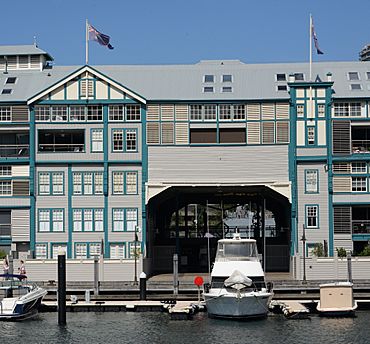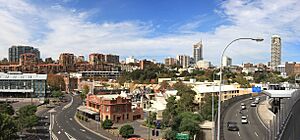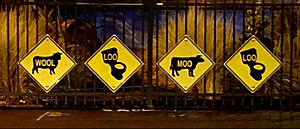Woolloomooloo facts for kids
Quick facts for kids WoolloomoolooSydney, New South Wales |
|||||||||||||||
|---|---|---|---|---|---|---|---|---|---|---|---|---|---|---|---|

Woolloomooloo Finger Wharf
|
|||||||||||||||
| Population | 4,011 (2016 census) | ||||||||||||||
| • Density | 8,000/km2 (21,000/sq mi) | ||||||||||||||
| Postcode(s) | 2011 | ||||||||||||||
| Area | 0.5 km2 (0.2 sq mi) | ||||||||||||||
| Location | 1.5 km (1 mi) east of Sydney CBD | ||||||||||||||
| LGA(s) | City of Sydney | ||||||||||||||
| State electorate(s) | Sydney | ||||||||||||||
| Federal Division(s) | Sydney | ||||||||||||||
|
|||||||||||||||
Woolloomooloo (pronounced WUUL-ə-MƏ-loo) is a cool harbourside suburb in Sydney, New South Wales, Australia. It's super close to the city center, just 1.5 kilometers east of the Sydney central business district. You'll find it right on Sydney Harbour, in a low-lying area that used to be busy docks.
This area was once mainly home to people who worked hard in the docks and factories. But recently, Woolloomooloo has been changing a lot. New buildings and homes have been built, especially along the waterfront, making it a more modern and popular place to live. Even with these changes, some homes in the suburb are still provided by the government to help people find affordable places to live.
Contents
History
Aboriginal Culture and the Name
The name Woolloomooloo comes from the first big house built here, called Wolloomooloo House. This house belonged to the first landowner, John Palmer. People aren't totally sure how Palmer got the name, but many think it came from different Aboriginal words.
One idea is that it comes from Wallamullah, which means place of plenty. Another idea is Wallabahmullah, meaning a young black kangaroo. Some people also thought it meant field of blood because of old tribal fights, or that it sounded like the Aboriginal way of saying "windmill," as there was a windmill nearby a long time ago.
European Settlement
When the First Fleet arrived in Sydney, this area was first called Garden Cove. This was because of a small, wooded island nearby called Garden Island. In 1793, John Palmer was given the first land grant here to raise cattle for the new colony.
In the 1840s, this farmland was divided into smaller pieces, creating what we now know as Woolloomooloo, Darlinghurst, and parts of Surry Hills. At first, rich families built amazing houses with beautiful gardens here. They loved the bay and how close it was to the city and Government House.
Over time, the area started to change. As more expensive houses were built further east, a new road was needed from Sydney. This road, William Street, was built right through the land, dividing it for the first time.
Trams in Woolloomooloo
Woolloomooloo once had its own tram line, which helped people travel around. It opened in different parts between 1915 and 1918. This tram line connected to the main city lines and ran all the way to Brown's Wharf. However, it was one of the first lines to close, in 1935, and was replaced by a bus service.
Landmarks
The Famous Finger Wharf
Woolloomooloo is famous for its amazing Finger Wharf. This wharf is incredibly long, about 400 meters (1,312 feet), and 63 meters (207 feet) wide! It stands on 3,600 wooden poles, making it a huge wooden structure.
The Sydney Harbour Trust built the Finger Wharf between 1911 and 1915 to help organize the busy Sydney Harbour. It became the largest wooden building in the world at the time. The wharf was very important for shipping, and many sailors and officers from the nearby Royal Australian Navy base at Garden Island would visit.
Over time, newer wharves were built, and the Finger Wharf became less used in the 1970s. By the 1980s, it was empty and falling apart. In 1987, the government planned to knock it down. But in January 1991, local people and unions protested and stopped the demolition. This was a "Green ban", which meant workers refused to demolish the historic structure.
In the mid-1990s, the wharf was renovated and given a new life. It was turned into 300 private apartments and a fancy hotel with 104 rooms. It also has several restaurants and bars. Famous people like actor Russell Crowe and former radio presenter John Laws have lived in the apartments here.
Andrew "Boy" Charlton Pool
On the western side of Woolloomooloo Bay, you'll find the Andrew "Boy" Charlton Pool. This popular swimming spot is located within the beautiful Royal Botanic Gardens.
Popular Culture
Woolloomooloo has been mentioned in many songs, books, and TV shows!
- The band The Bushwackers (band) has a song called Woolloomooloo Lair.
- In 1910, Steve Mullins recorded a song simply titled Woolloomooloo.
- The song "My City Of Sydney" by Tommy Leonetti (and later by XL Capris) mentions "That little church steeple in Woolloomooloo."
- The funny Monty Python comedy group set a sketch in the made-up University of Woolloomooloo, probably because of its unique Australian name.
- In the TV show Flight of the Conchords, a character says she is from Woolloomooloo.
- The musician Jean-Michel Jarre has a song called Wooloomooloo on his 1984 album Zoolook.
- In 1970, an Australian writer named Irina Dunn created the famous saying "A woman needs a man like a fish needs a bicycle" on a bathroom door in Woolloomooloo.
- The band Cold Chisel mentions Forbes Street and Springfield Avenue in Woolloomooloo in their song "Numbers Fall" from the 1982 album Circus Animals.
- The children's book The Kangaroo from Wooloomooloo by Joy Cowley features a kangaroo from this suburb.
- In the Dutch city of Utrecht, a student disco is called 'Woolloomooloo', or 'Woo' for short.
Notable Residents
Many well-known people have lived in Woolloomooloo, including:
- Mark Bosnich, a former football player for the Socceroos.
- Russell Crowe, a famous actor.
- Alessandro Del Piero, a former football player for Sydney FC.
- Delta Goodrem, a popular singer.
- John Laws, a well-known former radio presenter.
- Spanian, an Australian rapper.
 | Dorothy Vaughan |
 | Charles Henry Turner |
 | Hildrus Poindexter |
 | Henry Cecil McBay |



